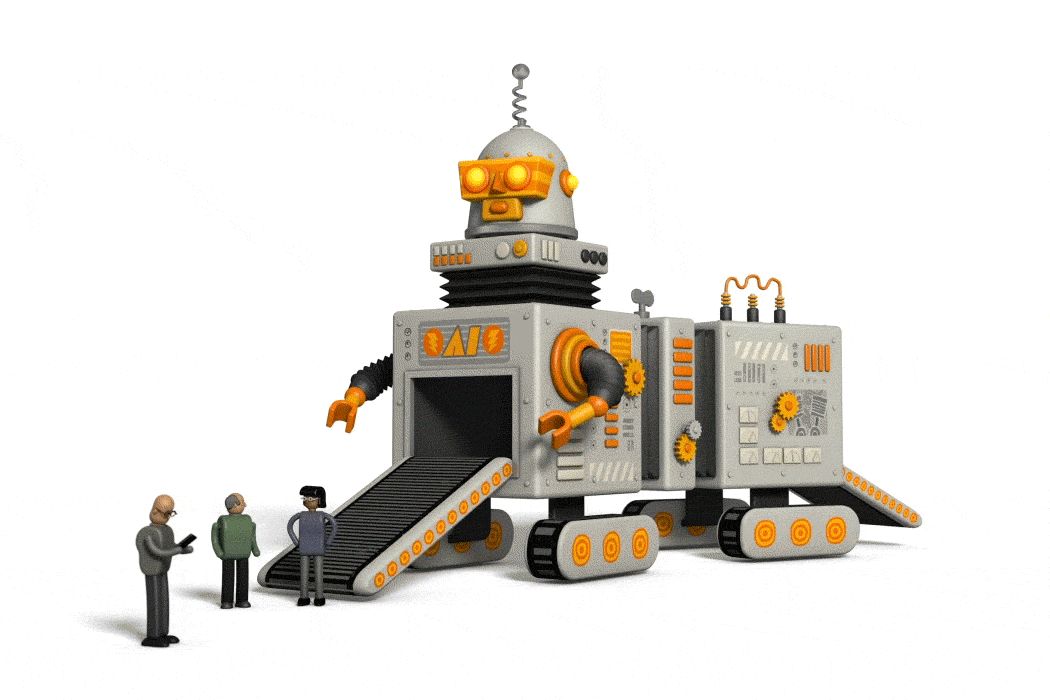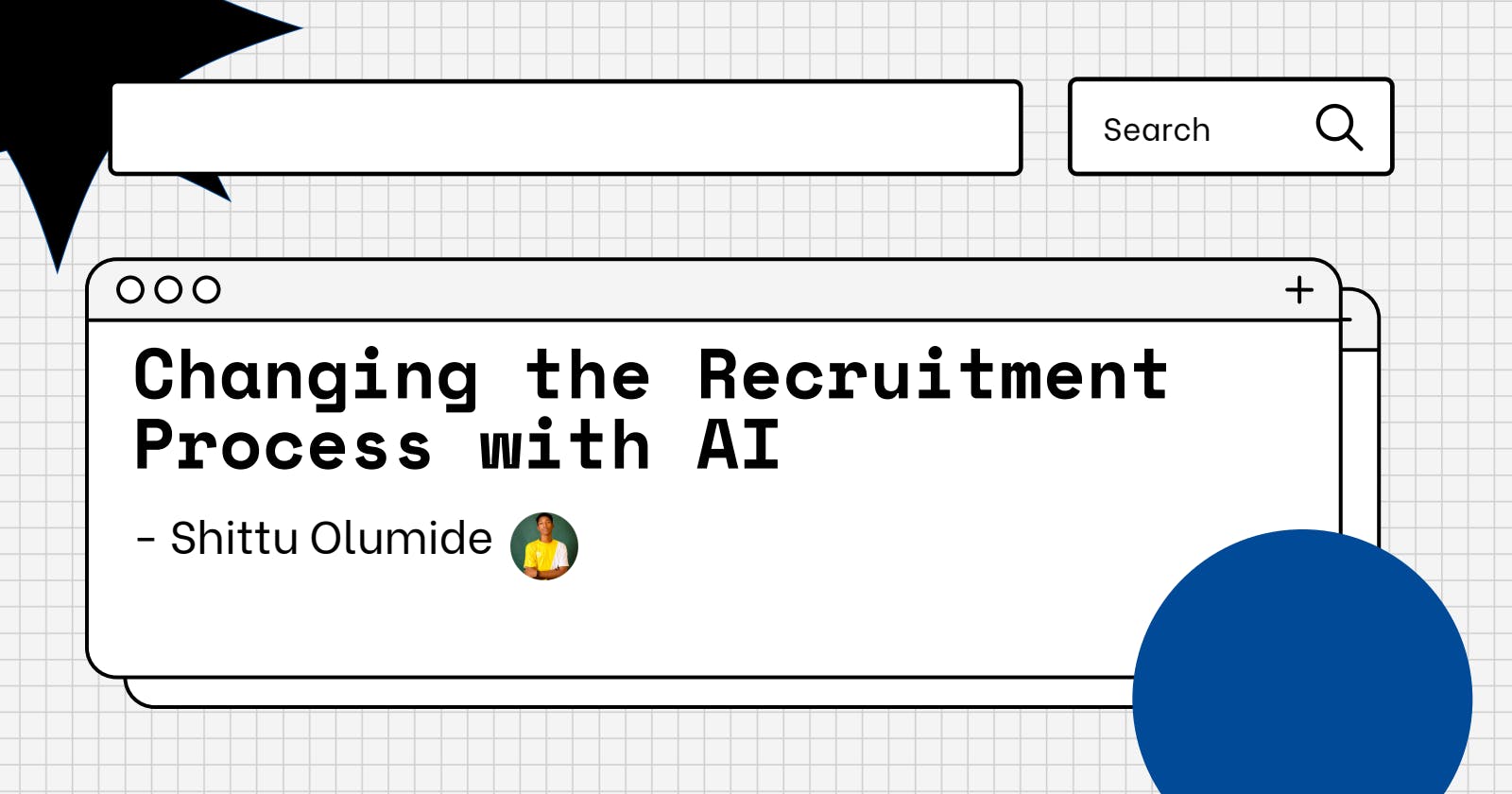Over the years, we have seen a lot of improvement in the growth and development of artificial development. In an interview with Andrew NG, a very prominent figure in the artificial intelligence space and the founder of LandingAI and DeepLearning.AI, co-chairman and co-founder of Coursera.
He discussed at length the future of AI in manufacturing ("one of those wonderful sectors that have such a profound effect on everyone's life, yet is so obscure to many of us"). He stated that according to a 2021 survey by The Manufacturer found that 65% of manufacturing industry leaders are seeking to pilot AI. Over the next five years, warehouses' implementation is anticipated to rise at a rate of 57.2% CAGR.
While AI is being used increasingly in manufacturing, the talent sourcing and recruitment industry have also been paying close attention to it.
In this article, we will learn about how AI is revolutionizing the recruitment industry, whether it is worth the stress, should your company use AI in their recruitment process, when they can hire a recruiter to perform all the tasks, AI tools for recruitment, these and many more are the questions that will be answered in this article.
Don't worry artificial intelligence won't take away our jobs.

What is artificial intelligence?
Artificial intelligence (AI) refers to a machine's or robot's ability to perform tasks typically performed by intelligent beings. The work of developing computer programs with the mental abilities that set humans apart from other animals, such as the capacity to reason, discern meaning, draw generalizations, and learn from past mistakes, is sometimes referred to by the expression.
All human behavior except the most basic is attributed to intelligence, whereas even the most complex behavior of insects is never regarded as a sign of intelligence.
Psychologists frequently consider a person's intellect to be a combination of many different skills rather than simply one feature. Learning, thinking, problem-solving, seeing, and using language are the areas of intelligence on which research in AI has mostly concentrated.
Artificial intelligence in recruitment
Applying artificial intelligence (AI) to the hiring/recruitment process is referred to as artificial intelligence (AI) in recruiting. Using AI or machine intelligence, recruiters can design or automate workflow, for example, for repetitive, high-volume tasks. Thus, AI can neutralize, accelerate, streamline, and lower the cost of the hiring process.
Recruiters use AI-assisted tools to find, evaluate, and hire the best candidates. Using AI-based technologies, employers can evaluate a candidate's education level, work experience, talents, and cover letters. AI also enables recruiters to assess candidates' suitability for a position by identifying inconsistencies, errors, or incorrect information in resumes.
Process of recruiting using AI
The following are some significant ways that AI is revolutionizing the hiring process:
Job Recommendations: Candidates can identify the employers that are best suited to them with the aid of AI-based job recommendation systems. These algorithms analyze the information from their profiles to determine a candidate's talents and interests. They then compare this information to the employment requirements and suggest the positions that are most pertinent to the prospects.
Automated Resume Screening: In the past, recruiters had to filter many resumes to discover the most qualified candidates. It took a lot of time and effort to complete this work. But using AI, this task can easily be automated. Using data mining and machine learning methods, AI-based resume screening tools examine resumes and identify the most suitable candidates. By applying filters or requirements, they remove all irrelevant CVs and only present the best ones.
Interview Scheduling: Scheduling interviews was an extremely time-consuming undertaking in the conventional hiring procedure. However, this task is easily automatable with AI. AI-based interview scheduling software considers the recruiters' and candidates' availability. They then coordinate the calendars and invite the prospects to interviews.
Predictive Hiring: Organizations can find the job candidates who are most likely to get hired by using AI-based predictive hiring solutions. These tools study the patterns of successful recruits using information from previous hiring choices. The likelihood of an applicant being hired for a specific job is then forecasted using this data.
Staff Retention: Organizations may maintain tabs on their staff with AI-based employee retention technologies. These tools use information from their profile to comprehend an employee's abilities, hobbies, and work history. Based on this data, they recommend the best job roles for the employees.
Pros of AI-based hiring
Reduces time and expense.
Enhances Communication.
It lessens Bias in Hiring.
Automates tasks with high volume.
It makes hiring managers more proactive in seeking out talent.
Cons of AI-based hiring
AI can learn biases in recruiting patterns
Accuracy issues can occasionally arise.
A human touch is necessary for some things.
Excessive reliance on specific keywords.
Setting up AI correctly might take a long time, especially when attempting to limit its drawbacks.
AI tools for hiring
Arya: Most comparable companies, like Arya, offer one-click job ad placement while using AI to source from internal databases, job boards, and social networks. From a single integrated candidate communication dashboard, recruiters may contact potential prospects by phone, text, email, and bots. This helpful feature facilitates the automation of customized messages and streamlines communication throughout the entire process to make getting in touch with prospects easier. It is possible to integrate ATS.
Manatal: The Manatal platform streamlines the entire hiring procedure by recommending the top candidates for a specific position and automating unnecessary tasks. Its AI recruitment software aims to find and hire people more quickly. It is easy to use but effective because it is explicitly designed for HR departments, employment firms, and headhunters. The ease of use means there is no steep learning curve, and the smooth drag-and-drop user interface makes it simple to create a recruitment pipeline according to your approach. Additionally, it is simple to see your hiring status in a single-board view.
Skillate: One of the finest tools available for AI recruiting is called Skillate. With AI-powered intelligent hiring services, people analytics, and enhanced candidate experiences, it is a cutting-edge decision-making engine that can significantly improve the hiring process. Companies can concentrate on making objective decisions by using the tool's capacity to label personal information about prospective hires.
TurboHire: An intelligent hiring platform powered by data is TurboHire. It is organized and offers lots of chances for beneficial cooperation. In-depth knowledge about potential candidates can be obtained via TurboHire by fusing human and artificial intelligence. The technology also encrypts interactions between users and the cloud and is entirely secure in protecting consumer data.
Turing: Turing has created a platform that connects you remotely with the top software developers in the world using AI. You can obtain a customized solution with Turing to help you quickly identify the ideal remote developer for your needs. Turing matches you with the best remote developer for your project in minutes using machine learning algorithms to scan through their pool of seasoned software developers. They provide a wide range of technologies, including video interviews, skills assessments, and analytics, that can assist you in locating the ideal candidate for your requirements.
So should your company use an AI tool in the hiring process?
Yes!
Final thoughts
As the trends have indicated, artificial intelligence drastically alters the recruitment process. Management of manual, repetitive duties is no longer necessary, HR managers and recruiters are realizing. Instead, they may take advantage of artificial intelligence and spend more time doing what they do best: listening to candidates, empathizing with them when necessary, and building trusting connections. To preserve a competitive edge in the future, personnel teams and recruiters must comprehend and adjust to the 21st-century workforce, including emerging technology and artificial intelligence, as the employment landscape changes today.

